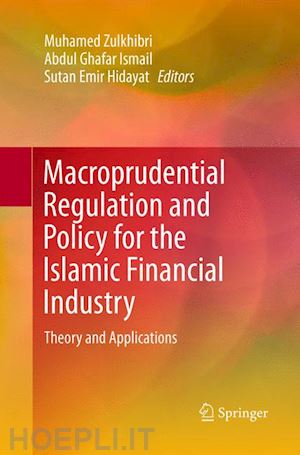
Questo prodotto usufruisce delle SPEDIZIONI GRATIS
selezionando l'opzione Corriere Veloce in fase di ordine.
Pagabile anche con Carta della cultura giovani e del merito, 18App Bonus Cultura e Carta del Docente
This volume aims to discuss the current research, theory, methodology and applications of macropreudential regulation and policy for the Islamic financial industry. Published in cooperation with the Islamic Research and Training Institute (IRTI), this book features contributions from a workshop presented in collaboration with the University College of Bahrain (UCB) in Manama, Bahrain, aimed to bring together experts in Islamic banking and regulation and financial economics. This resulting book sheds light on how macroprudential policy may be implemented in the Islamic financial system, and indicates current challenges and their effects on economic growth, financial stability and monetary regulation.
Macroprudential policy is increasingly seen as a way of dealing with the different dimensions of systemic risk. But many central banks, bank supervisors and regulators have limited experience with macroprudential tools, particularly in the Islamic financial industry. Given the complementarities between monetary policy and financial stability, it appears that central banks would always play an important role in macroprudential policy. But how should macroprudential policy best interact with monetary policy? It is becoming more pressing for the central banks to conduct monetary policy in which its conventional banking system operates side by side with Islamic banking system. This question has received increasing attention in the research literature but there is much we still need to learn. This is why new insights from research on macroprudential policy – which has gained important impetus in recent years – are so valuable.
Featuring contributions on topics such as macroprudential regulation, policy, tools and instruments; governance, systematic risk, monetary policy, and bank leverage, the editors provide a collection of comprehensive research covering the most important issues on macroprudential policy and regulation for the Islamic financial industry. This volume is expected to be a significant contribution to the literature in the field of Islamic finance and evaluation of public policies to promote the development for Islamic financial industry. It is also served as a key text for students, academics, researchers, policy-makers in the field of Islamic finance.
Dr. Muhamed Zulkhibri is a Senior Economist at Islamic Research and Training Institute, Islamic Development Bank, Saudi Arabia with years of progressive experience in the Central Bank of Malaysia and policy-oriented institutions. He involved in developing countries partnership strategy, undertaken research projects and advisory works with other development and policy-oriented institutions globally. He has authored extensively on Monetary Economics, Financial Institutions and Markets, Finance and Economic Development, Islamic Economics and Finance, with more than 80 research articles in leading academic journal, regulatory publication, industry report and the financial press. He has been invited to speak at many international conferences and he has lectured for under- and post-graduate program at the University of Nottingham, U.K and University Putra Malaysia. He earned a Ph.D in economics from University of Nottingham, United Kingdom.
Dr. Abdul Ghafar Ismail is the Head of Research division, Islamic Research and Training Institute, Islamic Development Bank and a professor of banking and financial economics at the University Kebangsaan Malaysia. He is on leave from School of Economics, University Kebangsaan Malaysia. He has been lecturing at the university since 1987 on economics and finance courses such as money and banking, financial economics, advanced macroeconomics, Islamic economics system, money and capital market in Islam and international finance; Islamic banking; money, zakat and the real economy; risk management in Islamic banking; Islamic financial management. His specialization is in the area of Islamic economics and finance. He has a Ph.D in economics from the University of Southampton, United Kingdom.Dr. Sutan Emir Hidayat is the Head of Business Administration Department at University College of Bahrain, Bahrain. He has presented research papers at reputable international conferences such as the IRTIconferences, the GRM 2012, University of Cambridge, U.K, the 11th Harvard University Forum on Islamic Finance, USA. He was also invited to speak at AAOIFI-World Bank Annual Conference and MEIF 2015. He has also published research papers in international journals and become a reviewer for the IMEFM, Emerald and Review of Financial Economics, Elsevier. He also has contributed chapters in four books. He is an Islamic finance journalist regularly publishes articles in Islamic Finance News. During his academic career, he has supervised and examined 32 Master Theses. Recognizing his contribution, he has been listed and awarded by ISFIN in Islamica 500 as one of the top 50 most influential people to the Islamic economy in 2015 on a global scale.











Il sito utilizza cookie ed altri strumenti di tracciamento che raccolgono informazioni dal dispositivo dell’utente. Oltre ai cookie tecnici ed analitici aggregati, strettamente necessari per il funzionamento di questo sito web, previo consenso dell’utente possono essere installati cookie di profilazione e marketing e cookie dei social media. Cliccando su “Accetto tutti i cookie” saranno attivate tutte le categorie di cookie. Per accettare solo deterninate categorie di cookie, cliccare invece su “Impostazioni cookie”. Chiudendo il banner o continuando a navigare saranno installati solo cookie tecnici. Per maggiori dettagli, consultare la Cookie Policy.